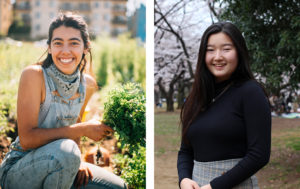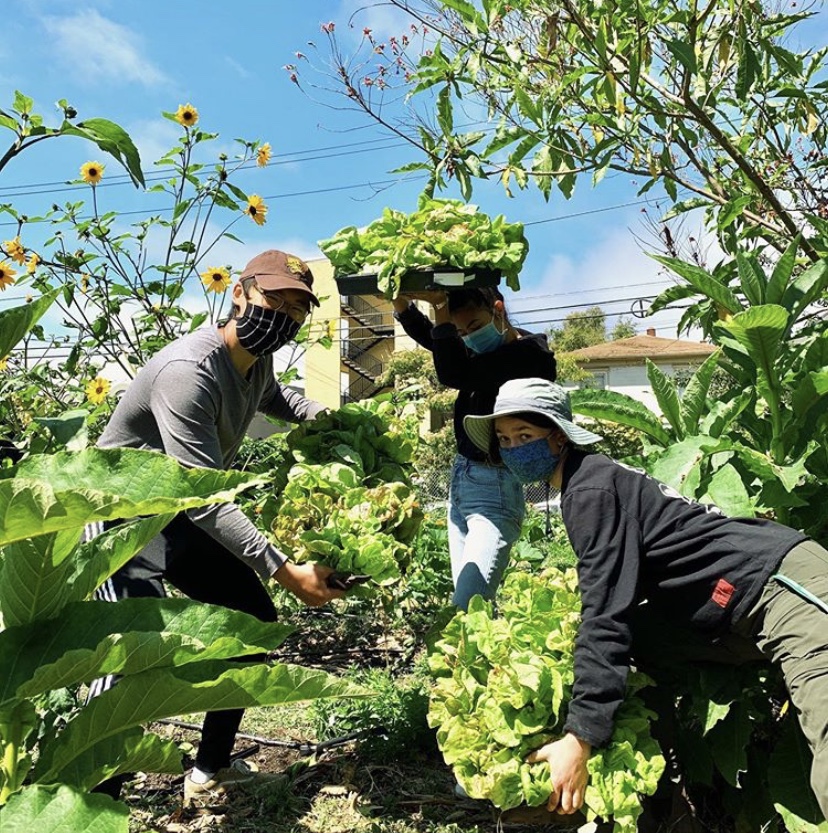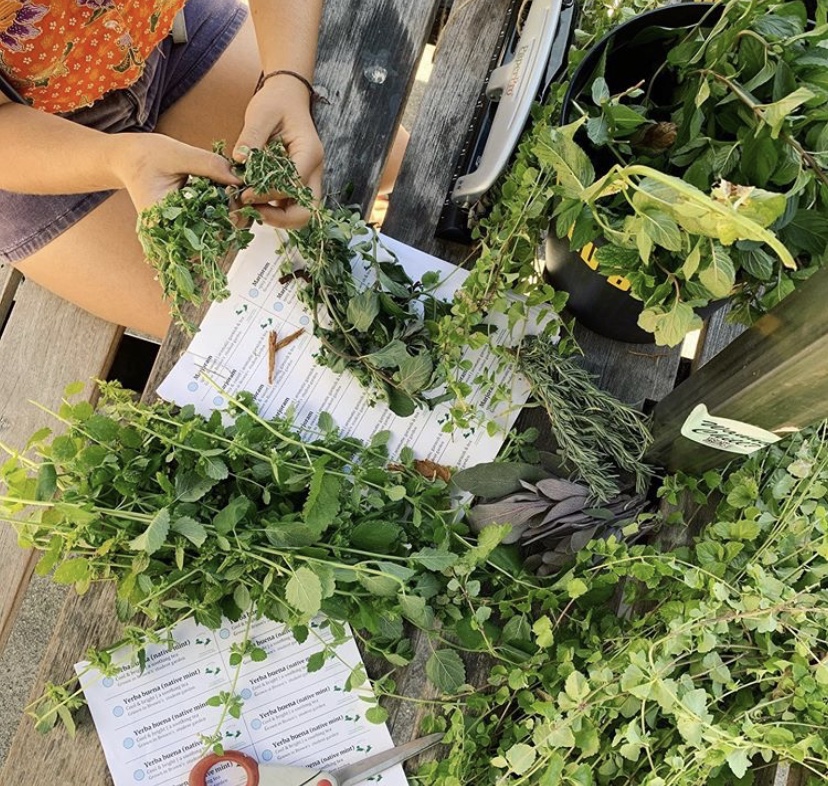 August 27, 2020
August 27, 2020
By Annika Levaggi and Moe Sumino
Annika Levaggi is a fourth-year undergraduate studying Environmental Science and serves as BFI’s Campus Gardens Outreach and Communications Coordinator. Moe Sumino is a second-year undergraduate studying Conservation and Resource Studies and serves as BFI’s Campus Gardens Data and Finances Coordinator.
Within the daily quarrels of quarantine, we have all been brought, in one way or another, to find new ways to survive. This summer, the creation of Berkeley Student Farms has, in part, grown out of a similar struggle to reimagine how we take care of our most basic needs. Berkeley Student Farms (BSF) is a coalition of eight student-run campus gardens at UC Berkeley dedicated to actualizing food sovereignty, land decolonization, and empowerment of BIPOC leadership, cross-campus collaboration, and intercultural place-based learning. The gardens are: Fannie Lou Hamer Black Resource Center Garden, Clark Kerr Garden, La Loma Rooftop, Brown’s Herbal Cafe Garden, Student Organic Gardening Association (SOGA), Oxford Tract, Guerilla Gardens, and the Multicultural Community Center Healing and Learning Garden.

Students harvesting lettuce for the UC Berkeley Basic Needs Center’s Food Pantry. Photo courtesy of Berkeley Student Farms.
At the most basic level, our network of campus gardens helps to fight food insecurity on campus, providing over 50% of the produce distributed at the UC Berkeley Food Pantry. But beyond tackling issues of access to fresh fruits and vegetables, BSF offers spaces for students to reclaim agency over what they eat. In our cases as an international and as a dual-citizen, we can rely on these spaces to grow our culturally relevant foods otherwise not listed on the dining hall’s menus. BSF holds space for education and community building offering open hours, workshops, decals, partnerships with researchers and professors. This summer alone, students have held 45 workdays, welcomed over 320 volunteers, and harvested more than 1,200 pounds of produce distributed between the UC Berkeley and City of Berkeley Food Pantries, Brothers of International Faith, Black Earth Farms, and UC Gill Tract’s Sunday farmstand. The resiliency of our campus gardens and gardeners during COVID-19 has provided space to heal, from much needed direct exposure to sunlight, distanced banter with friends, and a grounding sense of purpose amidst a global onslaught of existential uncertainty.
To me, Moe, Berkeley Student Farms and my work as the Data and Finances Garden Coordinator at BFI has shown me the power of collective organizing. My role has consisted of aiding gardens with their finances and equipment, creating content for the Instagram and website, and furthering the gardens’ reach both on-campus and in the greater Bay Area. The strengthening connections between once fragmented gardens that dot our campus are testaments to the power of unity and solidarity that underpin the mission of BSF. Off the farm, but not too far from it, I am entering my second year where my studies focus on food sovereignty and its relation to rural development. My experience growing up in the rapidly developing regions within Southeast Asia and Japan, alongside my current specialization in Rural Agricultural Development and Food Systems, has allowed me to envision how agroecology and policies can support more resilient rural communities.
For myself, Annika, as a rising senior my work with the Berkeley Food Institute and more largely this past season of abundance have been an opportunity to share the knowledge I have been gifted during my time at Cal to the next generation of Berkeley Student Farmers and within that process, help lay roots for a resilient and regenerative future of BSF. With an academic background focused in Environmental Science and Food Systems, much of my time at Cal has been as a researcher, in the Bowles Agroecology Lab as well as overseas in Southern Chile and Perú. I am curious about how the transition to agroecology, by forging positive connections with the ecology around us, can strengthen and heal our communities. And so my work, supporting farm operations with BSF and connecting farmers with resources and support, has in many ways been a natural outcropping of my academic experience at Cal.

Every week, volunteers from the Housing and Dining Sustainability Advocates (HADSA) harvest over 50 bundles of herbs for the campus’ Basic Needs Pantry. Photo courtesy of Berkeley Student Farms.
With the second blossoming of our figs trees just a few weeks away, we are reflecting on our harvests from the summer and sowing seeds for the fall. Saving our summer seeds, we have felt inspired by our work to connect all the campus garden managers and volunteers to forage new ways that we can support each other; from ensuring the safety of our gardens, both from COVID and otherwise, to pooling resources and mobilizing support. And in the greenhouse, our fall favorites—artichokes, mustard greens, sweet potato and kohlrabi—are germinating and excited to feed, teach, and heal us through the next semester. With the seasons, we are shifting our focus to offering more educational opportunities in agroecology and food justice co-dreaming our workshops with Sogorea Te’ Land Trust and CNR faculty, deepening our partnership with the Basic Needs Center, and continuing to provide safe and healing opportunities amidst a pandemic.
If you’re interested in getting more involved, here are some ways to connect with us:
- Berkeley Student Farms Instagram, which advertises all Open Hours and highlights the specific work each garden is doing during workdays
- bCalendar to add garden events
- Email listserv
- Berkeley Student Farms Facebook group, which highlights resources and opportunities
- Berkeley Student Farms website
- Campus Garden webpage published by BFI